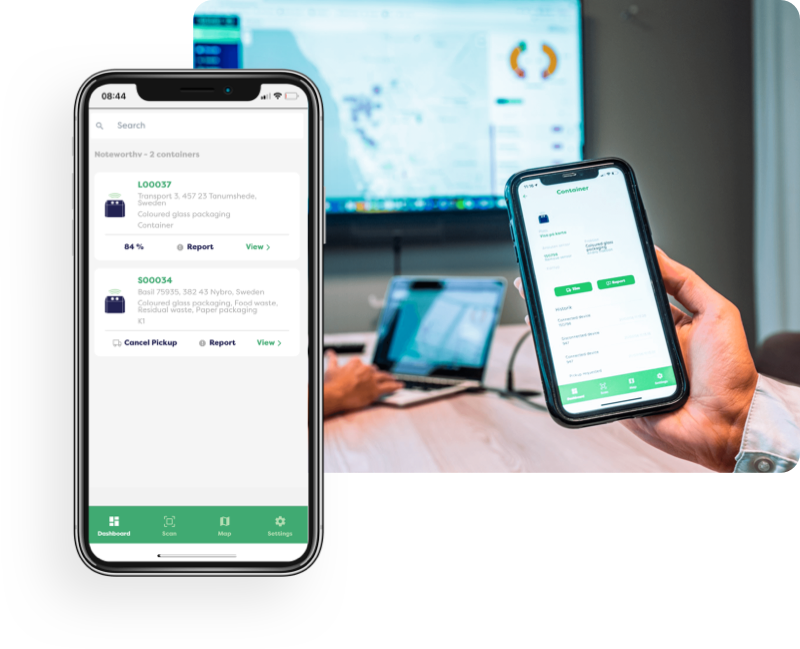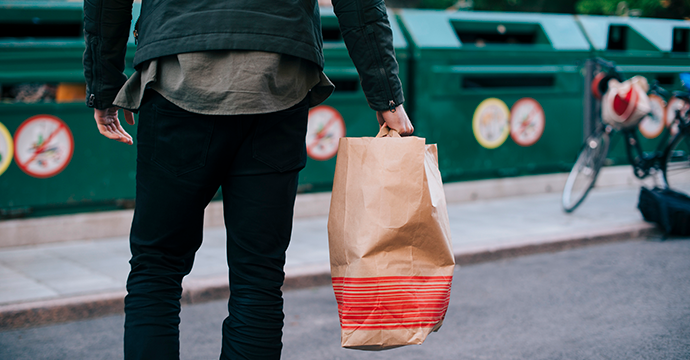The shift in responsibility for the collection of packaging could be the fresh start that an application like recycling stations needs. In previous collaboration, between FTI and Bintel, data has been collected from 1000s of containers, and the conclusions based on this data were that the development potential is huge. With new ownership and new eyes, we believe that the country's recycling stations can be elevated to something better.
We now see that more and more municipalities are choosing to do as VA SYD and start their digitalization journey, and that they start it by connecting their ÅVSs.
Lars-Fredrik Alingfeldt, Unit Manager at VA SYD'swaste department, describes the purpose of the initiative as follows:
"For me, the level sensors have been about getting a good overview and the possibility to follow up on the emptying of the WASs in time. Now that everything is new to us, it's important that we quickly learn how the collection of waste is done."
A journey with 2 stops in time
When we look at how VA SYD plans its journey towards well-functioning EVSs, it has 2 time horizons.
Short term - Fixing the situation, here and now
The first time horizon is about acting here and now, to fix what is creating problems today. Similar to the situations Bintel has seen in our collaboration with FTI, we also see that most stations have problems handling the current inflow of paper and plastic packaging.
Jenny Sponn, Strategic Purchaser at VA SYD, has this to say about the collection service they currently purchase:
"With regard to paper and plastic, the level sensors have so far verified what we have seen, that the stations are often undersized. We need to review the capacity for emptying these fractions. In the short term, we will use the sensors to adjust the emptying intervals."
So a natural first step is to use sensor data to adjust capacity according to current needs. This is to avoid littering and cut down on heavy traffic, right now.
Jenny continues:
"We use data to time the infrequent fractions (glass, metal, newspapers) and follow up to make sure they are emptied on time. Now in the next step, we will review the emptying intervals, and then test some type of on-demand emptying."
So, managing the seasonal fluctuations we see in most municipalities requires more flexibility than just rescheduling and resizing. The key to well-functioning and future-proofed WSSs is to use data proactively, typically through demand-driven emptying.
Medium term, a few years ahead - Demand-driven emptying is key
The volumes collected in recent years not only show record volumes year after year, but also show large regional differences. Some municipalities have a decreasing trend for packaging and some have a strong increase.
Furthermore, the inflow of packaging varies greatly over the season, with some municipalities having a relatively even load over the year and some having huge seasonal fluctuations.
In VA SYD's case, we see a sharply increasing trend for e.g. paper and plastic packaging. If the trend continues, they will have 25% more packaging in their EVSs by 2027. A situation that today would be completely unsustainable to handle. Without data and planning, it is difficult to act proactively on this.

During the project, measurements will show how the inflow of packaging varies during the year in Malmö, and how it will affect different locations in Malmö. These insights will also be valuable in a proactive work, for example as a basis for resource planning in the coming seasons, as a basis for procurement of an efficient collection and to be able to make effective models for demand-driven emptying.
Other forces that affect the load on our EVS are that Curb-side collection is becoming more and more developed in our country. This should relieve some of the workload of some TAOs, but which ones and how much again requires good data and work to get an overview.
We at Bintel look forward to following VA SYD'sand other municipalities' journey towards well-functioning recycling stations.
Do you have questions about how to make your new EVS work in the best possible way?
Bintel Insights™ is the center for digital insight-driven innovation. waste management

We want to streamline waste management thereby increasing circularity and improving resource utilisation.

